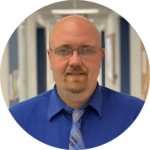WANT TO BE A NEW CHAPTER ALUMNI?
Apply online to share your accomplishments and endeavors.
APPLY TO BE FEATUREDFebruary 2026

St. Louis, Missouri
Assistant medical director, Clinical Microbiology, Division of Laboratory and Genomic Medicine, Department of Pathology and Immunology
Washington University School of Medicine
VIEW PROFILENeil Anderson, M.D. (CM ’14), had an unusual upbringing. He grew up at a zoo — literally. His father was a zoo director, and the family lived on site, had free run of the zoo and volunteered there. Dr. Anderson transferred his interest in veterinary medicine and biological diversity into a career in pathology and clinical microbiology. Today he’s assistant medical director of the Microbiology Laboratory and medical director of the Molecular Infectious Disease Laboratory at Washington University School of Medicine in St. Louis. Coming full circle, Dr. Anderson says as a microbiologist, he has his own little zoo of microorganisms.
“I felt the Minnesota Nice — everyone is very supportive. Compared to other institutions, Mayo has a well-established culture that everyone adopts and that affects how people treat each other with mutual respect and put patients first. It’s a cohesive community with a strong culture.”
My dad was a zoo director, and our family lived at the Northeastern Wisconsin Zoo, now known as the NEW Zoo & Adventure Park, in Suamico, Wisconsin. I had an early interest in veterinary medicine and a passion for infectious diseases and biological diversity.
As kids, we had free run of the place and also worked and volunteered at the zoo. We gave tours to school groups. My dad is still the director there.
As a microbiologist now, I have my own little zoo of microorganisms.
I’m trained in pathology and clinical microbiology, having completed a residency in anatomic and clinical pathology at the Medical College of Wisconsin in Milwaukee and a fellowship in clinical microbiology at Mayo Clinic. I like learning about microorganisms and their interaction with human health, and coming up with diagnoses.
Mayo is well respected in clinical microbiology. Mayo has a large variety of patients and a whole team of experts in areas including virology, parasitology and bacteriology. It’s a uniquely broad expertise. The reference lab at Mayo Clinic has an unparalleled diversity of specimens from around the world.
I felt the Minnesota Nice — everyone is very supportive. Compared to other institutions, Mayo has a well-established culture that everyone adopts and that affects how people treat each other with mutual respect and put patients first. It’s a cohesive community with a strong culture.
Bobbi Pritt, M.D. (CM ’07), Division of Clinical Microbiology, was a mentor, and I continue to work with her on the College of American Pathologists Microbiology Committee. She’s been a fantastic mentor throughout my career.
Other mentors in the Division of Clinical Microbiology were Matt Binnicker, Ph.D. (CM ’06) Robin Patel, M.D. (I ’92, INDF ’95, CM ’96), division chair; Elitza Theel, Ph.D. (CM ’12), and Joseph Yao, M.D. (I ’87).
I frequently reach out to Mayo Clinic experts on challenging patient cases. I will contact Dr. Yao for help with a challenging HIV case. I’ve sent images to Dr. Pritt. Sometimes it’s a quick email, sometimes it’s a specimen and formal testing in reference lab. Mayo Clinic is a resource to you long after you complete your training there. I try to pay that forward. Fellows I’ve trained reach out to me from their new institutions.
Mayo Clinic teaches the need for teamwork and what you can accomplish when you have mutual respect and look at patient care through multiple experts working together. No single person has all the answers. As a collaborative group, you can provide amazing care.
I wear two hats. I’m assistant medical director of the Microbiology Laboratory and medical director of the Molecular Infectious Disease Laboratory at Washington University School of Medicine in St. Louis. We don’t see patients every day but do see little parts of them (their specimens) to help determine their diagnoses.
My other role is education. I’m program director for the anatomic and clinical pathology residency. I guide our more than 30 resident trainees through training so they can become surgical and clinical pathologists.
I’m living it now. I’m able to provide the best care, be a meaningful member of the health care team, be a leader in the microbiology community and a meaningful contributor to my field, and play a role in educating the next generation of laboratory scientists and surgical pathologists.
Medicine is a team sport. Know your expertise, where you can contribute and when to ask for advice. Pathologists play a role in helping their physician colleagues; know how you can help the overall care of a patient by being part of the team.
Enjoy what you do. Take a look at Dr. Pritt and how much fun she has in her job.
I’m married and have two dogs. We like to explore the outdoors and parks with our dogs. We like eating out and going to social events and football games.
I spent my entire childhood at a zoo!
See past New Chapter stories here.
Apply online to share your accomplishments and endeavors.
APPLY TO BE FEATURED